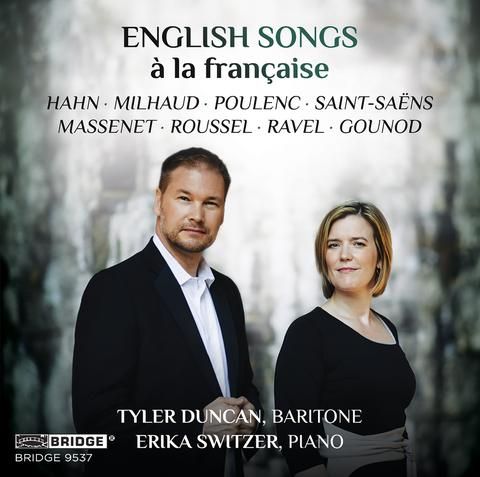English Songs à la française, with love from Canada

What a lovely idea! Songs with English texts set by French composers sung by British Columbia born (now New York resident) baritone Tyler Duncan and his wife, pianist Erika Switzer.
Venezuelan-born French composer (he moved to paris while still a child) Reynaldo Hahn's music has a beautiful, fragrant sense of repose. Listen to the magic of the fourth, "The Stars," the piano's tremolos creating a bed for the awed voice:
For this set of five songs, Hahn sets Robert Louis Stevenson; for all their simplicity and charm, they were written on the Front in the First World War. Tyler Duncan is the perfect singer, spinning his lines magically over Switer's exquisitely delivered accompaniments (she has a very keen ear, particularly where pedalling is concerned).
The programme of the disc is beautifully thought through. How magically there seems to be a twist in the harmonies as we enter the more pungent world of Darius Milhaud (a master of polytonality: some of his works layer keys over each other. In fact he took thsi idea to its logical extreme by stating that his 14th and 15th string quartets can be played simultaneously by two quartets and played as an octet!). A much under-rated composer (ever since I performed in his Dixtour for ten winds in my teens, I was hooked), his Child Poems, settings of Rabindranath Tagore, surely represents one of his materpieces - or at least, Duncan and Switzer persuade us so. Just listen to the rarefied harmonies in the piano part in "Sympathy," the fourth song:
Poulenc seems unbearably poignant (his setting of Shakespeare, Fancy, which is rather interestingly and bizarrely dedicated to the child protagonists of Britten's Turn of the Screw, Miles and Flora). And how wonderful to have a reminder of the beauty and genius of Saint-Saëns (I am determined to cover an opera of his on here, ideally Henry VIII, a piece I have considered an underrated masterpiece since my first ecposure). The surprises keep on coming: Massenet's glorious, almost mystical 1880 setting of Come unto the garden, Maud. Let's hear one of the Saint-Saëns songs (it makes sense to go for A Voice by the Cedar Tree, also Tennyson) and that Massenet back-to-back:
The revelations keep on coming, Albert Roussel's A Farewell, one of only two poems he set in English (the text is by Ernest Oliphant) is mysterious, destabilising, with a repeated figure in teh piano left-hand that is downright ominous. The other song is here, too, a setting of Joyce, A Flower given to my Daughter. Lovely to have Scotland represnted too in Ravel's Chanson écossaise. But let's talk Gounod.
A gala in Paris in June 2018 at the Maison de la Radio France celebrating Gounod's 200th anniversary reminded me of his stature (review here). How wonderful to have full five Gounod songs, settings of Longfellow (x2), Byron, George Wither and Shelley. Listen to how Duncan almost narrates the amazing Longfellow song, Beware!:
The longer Maid of Athens (Byron) finds Duncan spinning a line like silk before two songs offer us two typers of farewell: a lullaby and Shelley's Good Night, a meditation on what the "Good" bit might mean ...
But it is Milhaud who has the last word, two more Tagore settings, now as that composer's Op. 30 of 1915 (collectively titled in French Poèmes d'amour). And how utterly beautiful they are. Here, as our farewell for today, is the second, Peace, my heart:
.
